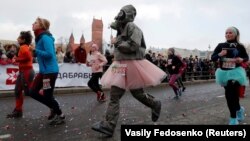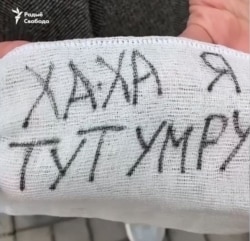At first glance, mandating a coronavirus lockdown might seem no obstacle for Belarus, long dubbed “Europe’s last dictatorship.” Yet, so far, it is the only country in its region that has refused to impose obligatory restrictions on freedom of movement in response to the pandemic.
Arguably, Belarus’ 65-year-old hardline leader, President Alyaksandr Lukashenka, is the reason why. Charging that border closures stem from “psychosis,” Lukashenka considers that “the world has gone crazy” over the pandemic. A proponent of hand-washing with vodka, he does not actively discourage self-isolation, yet notes that the economy, rather than the virus, is Belarus’ priority.
Regionally, Belarus has the lowest number of confirmed coronavirus cases (86, without deaths, according to the latest official data). But with global COVID-19 concerns increasing, some Belarusians, though apparently a minority, are sidestepping “Batka” (“Father”), as the president is known, and pushing for stronger anti-virus measures or imposing them on their own.
A Telegram-powered map of Belarusians isolating themselves shows 2,706 such instances to date among this country of roughly 9.5 million. Telegram subscribers submit their own information to the map, called Ya Doma (I’m At Home).
Belarusian programmer Anton Turko and designer Siarhey Pekhtsiarau created the map “to support those who are in self-isolation so that they know they are not alone,” Pekhtsiarau told the independent TV channel Belsat. It is also intended as a rallying cry for more people to quarantine themselves and reduce the pandemic’s risks to public health.
Many Belarusians appear to agree. A street celebration in Minsk to mark Belarus’ March 25, 1918 declaration of independence from the Russian Empire was canceled because of such concerns.
Elsewhere in the country, two shoe factories in the northeastern city of Vitebsk have imposed quarantines. Krasny Oktyabr (Red October) has stopped work entirely until April 3, while Belvest has banned non-employees from entering the factory, ordered the use of face masks, and required employees returning from trips abroad to test for the virus and quarantine themselves for two weeks.
“We also hope that the country’s leadership will take additional measures to limit the spread of the coronavirus,” Belvest Director Yuri Sumaneyev told one Vitebsk news outlet.
That desire appears particularly marked in regard to the country’s educational institutions.
As of March 25, 16,050 people had signed a Petitions.by appeal for the government to require coronavirus tests for all students, ban mass gatherings, and order 14-day quarantines for students returning from pandemic trouble spots, among other measures.
“We want the authorities to do more to restrain the spread of the coronavirus,” said Anastasia Sakharchuk, a Minsk State Linguistic University student taking part in a March 19 flash mob to distribute handmade face masks in the Belarusian capital. “We understand that not many people are getting infected, but we want to stop the spread as soon as possible.”
Three days later, though, Deputy Health Minister Yelena Bogdan told the state-run CTV that “the situation is completely under control.”
Nonetheless, an institute of higher learning overseen by the presidential administration, the Academy of Public Administration, was actually the first Belarusian educational facility to start online lessons, according to Belsat.
Other educational institutions have banned outsiders from entering dormitories, and some have canceled large gatherings and lessons. The country’s largest university, Belarusian State University, has shifted classes to a later schedule to avoid pile-ups in Minsk’s mass transportation.
Reports have surfaced that the Education Ministry intends to announce a general quarantine, but, in a March 25 livestream, Education Minister Sergei Kasperovich emphasized that such a measure is “inexpedient.”
“We don’t see any necessity in that today,” he said.
Former opposition parliamentarian Anna Kanapatskaya likens the Belarusian government’s refusal to impose similar restrictions to a “crazy mother who’s trying to carry a child across six lanes of traffic on a highway when the light is red.”
“Maybe, in the end, she’ll make it across, and nothing will happen to her, but how justified is this risk?”
If people start to die, Kanapatskaya added, Belarusian society “will not forgive the authorities for this.”
The government maintains it recognizes the risks of COVID-19 but sees no reason to panic. Aside from the 27 patients reportedly cured, it claims that its "more than 21,000" coronavirus tests rank Belarus among the top 10 countries in the world for coronavirus testing.
What measures have been taken to counteract the virus are deemed “precautionary,” and largely against an outside threat. The country’s first coronavirus case came in late February from a student returning from Iran.
Although Belarus’ borders remain open, President Lukashenka warned on March 21 that anyone wishing to leave the country needs permission from the Foreign Ministry. Otherwise, foreign travel should be avoided, he stressed.
The Health Ministry has recommended that Belarusians returning from abroad isolate themselves for 14 days. Border control distributes booklets with the official guidelines, which those entering Belarus reportedly must sign.
Aside from hand-washing and temperature monitoring, the Ministry also has promoted the practice of social distancing, sanctioning Belarusians doctors and nurses joining the international #StayAtHome campaign.
Though Lukashenka has pooh-poohed a national quarantine, 1,200 Belarusians with coronavirus symptoms have been quarantined in hospitals, according to Health Minister Uladzimir Karanik.
Face masks, though, are seen as only for those with respiratory infections. The president has said that he ordered Belarusian companies to produce more face masks, but claimed he was told there was insufficient demand.
In televised remarks on March 24 to China’s ambassador to Belarus, Cui Qiming, President Lukashenka blamed the media and, once again, “psychosis” as the real causes of the COVID-19 threat.
“More than anything, I’m afraid that people are sick from psychosis, from what happens in mass media. Psychosis leads to all other diseases,” he informed the ambassador. “That’s what the specialists also say.”
But one senior Ukrainian official doubts that the president, who intends to run for reelection in August, can hold off for long from imposing a quarantine.
Concealing the truth about disasters is an old Soviet technique that President Lukashenka, a former collective farm boss and Communist Party official, knows well, commented Ukrainian Deputy Interior Minister Anton Herashchenko in a March 20 YouTube interview with Ukrainian journalist Dmitry Gordon.
“[C]omrade Lukashenko knows perfectly well that Belarusians are just as susceptible to the illness” as other nations, Herashchenko continued. “He probably just doesn’t want to set off a panic or he wants to show that he’s special.”
Lukashenka himself has proposed some down-home remedies for the virus: drinking 40-50 grams of vodka per day, hand-washing with vodka, eating meals on time, visiting dry saunas, or even, in a nod to Belarusian national symbols, riding a tractor in a field of crops.
Meanwhile, in Minsk, life continues largely as usual, with few people wearing face masks. The city hosted the March 19 opening of Belarus’ soccer season before a crowd of spectators – the only country in Europe’s Premier League to do so.
While one local soccer fan shrugged off the virus threat, another commented that the insouciance is “scary.”
“People probably haven’t understood yet what’s going on,” he said.
Despite the public calls for self-isolation, many Belarusians still see no cause for alarm.
“For now, it looks like Belarus is coping [with the pandemic], at the level of response that has been taken,” commented one violet-coated, older woman in Minsk. “In our country, people don’t panic.”
With additional reporting from Belsat, Belta, CTV, Narodniya naviny Vitsebska, and RFE/RL’s Belarusian Service





